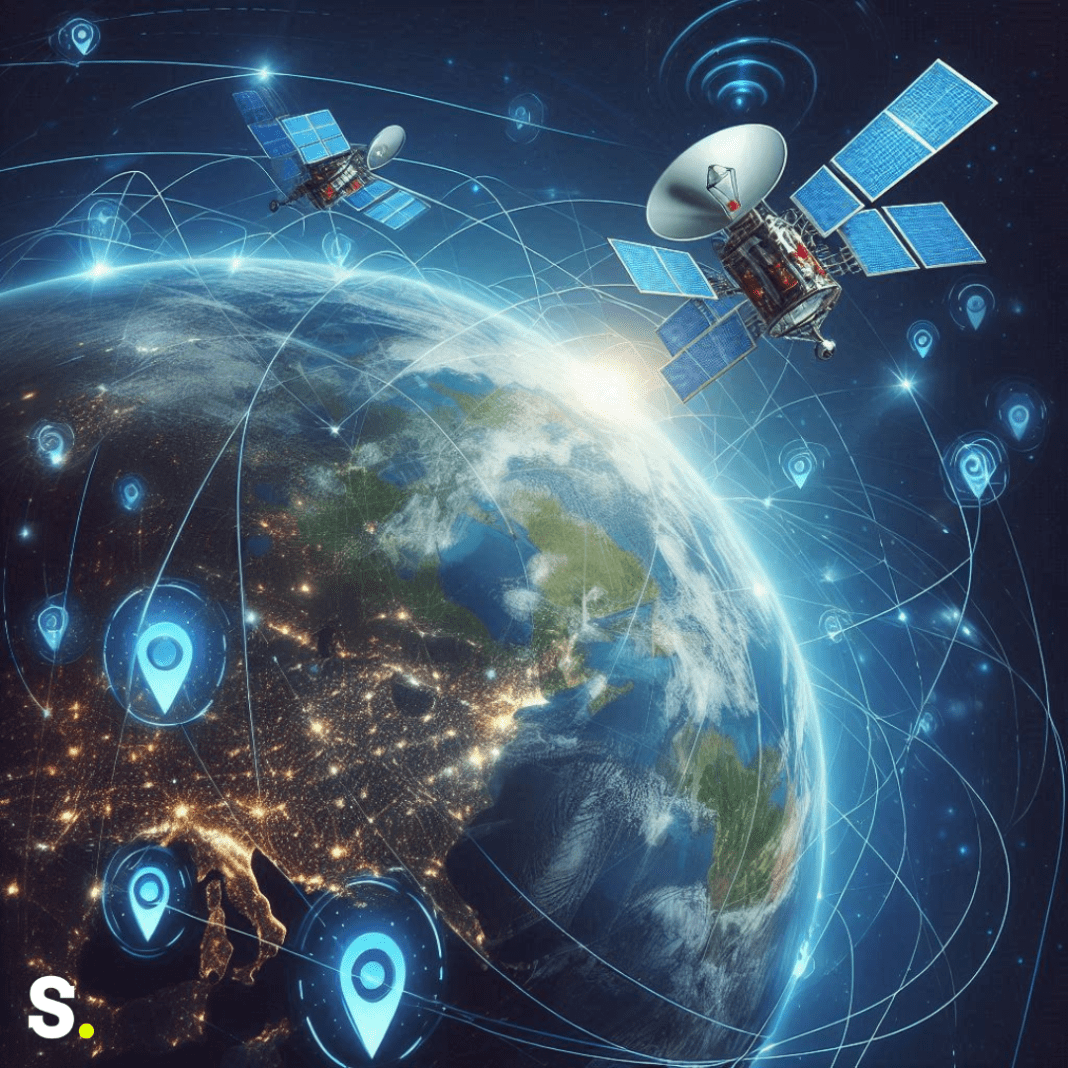GPS stands for Global Positioning System, and it’s like a superpower that helps us know where we are on Earth.
Imagine you’re lost in a big, busy city with tall buildings all around you. You pull out your phone, tap an app, and suddenly, it tells you exactly where you are and how to get home.
That’s Global Positioning System (GPS) working its magic!
It’s in your car, your phone, and even some watches. But did you know that GPS wouldn’t work without something called spacetech? Spacetech is all the cool stuff we send into space, like satellites, and it’s making GPS better than ever.
Years ago, people used paper maps or asked strangers for directions. Now, GPS is everywhere, helping delivery drivers drop off your pizza or guiding ships across giant oceans. It’s all thanks to satellites floating high above us in space. These space based positioning navigation and timing satellites are the secret behind why GPS works so well !
Satellites: The Eyes in the Sky
Picture a bunch of metal boxes with antennas floating way up in space, higher than airplanes or clouds. These are satellites, and they’re the heart of GPS. Spacetech companies build these satellites and shoot them into space using big rockets. Once they’re up there, they circle the Earth and send signals down to us. Your phone or car picks up those signals to figure out where you are.
Each satellite is like a tiny space helper. There are about 30 of them working together right now, all part of a big team called a constellation. They’re spread out so that no matter where you are—on a mountain, in a desert, or even at the beach—at least four satellites can “see” you. Spacetech makes sure these satellites are super smart and tough, able to handle the cold, empty space and keep working for years.
When you use GPS, your device listens to the satellites’ signals. Those GPS signals tell your phone how far away each satellite is. By doing some quick math, your phone figures out your exact spot on Earth. It’s like a game of hide-and-seek, but the satellites always know where to find you, thanks to spacetech!
Tiny Clocks That Rule the World
Did you know that GPS doesn’t just use signals to find your location—it also needs perfect timing? Every GPS satellite in space has a special clock called an atomic clock. These clocks are super accurate and can measure time down to a billionth of a second! Spacetech experts install these clocks inside satellites before they launch into space, making sure they keep perfect time even in the extreme conditions of space.
These atomic clocks are the reason why the Global Positioning System (GPS) works so well. When you use GPS devices, Google Maps, or a GPS tracker, your phone connects to multiple GPS satellites. These satellites send signals that tell your phone the exact GPS location in real time. But if the clocks were even a little bit wrong, your location could be miles off!
Atomic Clocks Keep Cellular Networks and GPS Running Smoothly
Atomic clocks don’t just help with navigation—they also help cellular networks work properly. Mobile towers use them to keep calls and messages in sync. Without atomic clocks, your phone’s internet could slow down, and GPS devices wouldn’t work accurately. They help emergency services, businesses, and everyday users by keeping time perfect for real-time navigation and communication.
Since these clocks are so important, spacetech engineers spend years designing and testing them. They use rare materials and make sure the satellites protect the clocks from space’s harsh conditions, like extreme cold and radiation from the sun. Thanks to these powerful atomic clocks, Google Maps, GPS trackers, and all GPS location services work smoothly and accurately, helping you find your way anywhere in the world!
Fixing the Signal Jumble
Sometimes, GPS signals have a tough time reaching you. They can bounce off tall buildings, get blocked by thick trees, or even get scrambled by storms in the sky. That’s
where spacetech steps in to save the day. New satellites are being built with stronger signals that can cut through all that mess.
Spacetech companies have found ways to make satellites send multiple types of GPS signal. Think of it like having a backup plan—if one signal gets lost, another one can still get through. This means GPS works better in tricky places, like big cities with lots of skyscrapers or deep forests where trees block the sky. Some of these new satellites are already up there, helping your phone find you faster and more accurately.
Another cool trick is something called “dual-frequency.” It’s a fancy way of saying the satellites send two signals at once. Your phone can compare them to figure out if something—like a storm or a building—is messing with the signal. Spacetech invented this to make GPS tougher and smarter, so you’re never left guessing where you are.
Powering Everyday Life
GPS isn’t just for finding your way—it’s quietly helping the world in tons of ways, all because of spacetech. Farmers use it to plant crops in straight lines and know exactly where to water them. Delivery trucks use it to bring packages to your door super fast. Even ambulances and firefighters rely on it to rush to emergencies without getting lost.
Airplanes are a big one too. Pilots use it to land safely, even when it’s foggy and they can’t see the runway. Spacetech keeps the satellites working so planes can stay on the right path, high above the clouds. Ships in the middle of the ocean use GPS too, so they don’t bump into rocks or drift off course. It’s amazing how one system, powered by spacetech, touches so many parts of life.
Even your video games or apps might use GPS! When you check into a place online or play a game that knows where you are, that’s where it starts work. Spacetech makes sure the satellites are always ready to help, no matter how many people are using them. It’s like an invisible helper that’s always on duty.
Launching New Helpers into Space
The satellites up there don’t last forever. After about 10 or 15 years, they get old and tired. Spacetech companies are always busy building new ones to replace them. Big rockets carry these shiny new satellites into space, where they join the team. Each launch is like a birthday party, keeping it strong and ready to help.
These new satellites aren’t just replacements—they’re upgrades! They have better technology, like stronger signals and tougher bodies to survive space longer. Spacetech workers test them on Earth first, shaking them and freezing them to make sure they won’t break. Once they pass the tests, they’re loaded onto rockets and sent up to join the constellation.
Launching satellites is a big deal. Rockets are loud and powerful, blasting off with fire and smoke. It takes a lot of people working together—engineers, scientists, and more—to make it happen. Spacetech doesn’t just build the satellites; it figures out how to get them into space safely. Every new satellite means GPS stays alive and keeps helping us every day.




